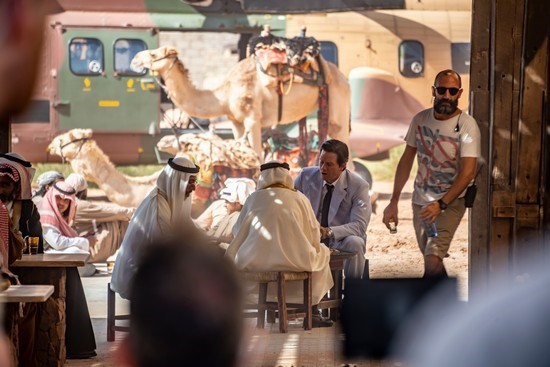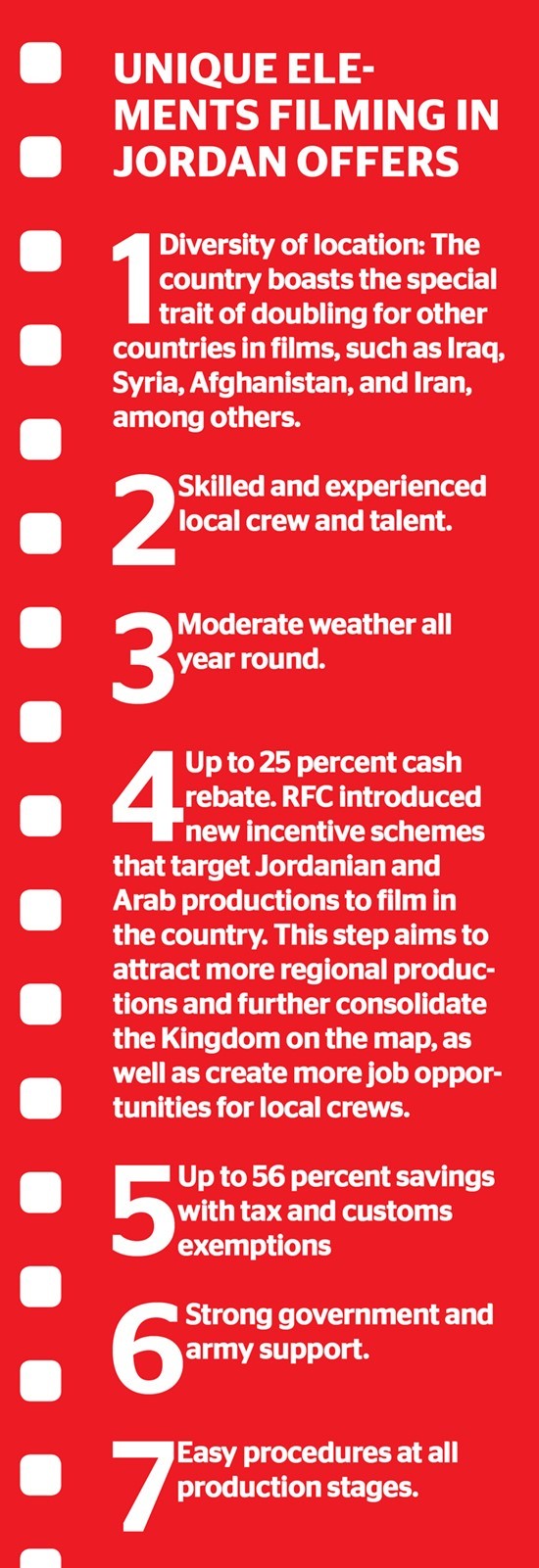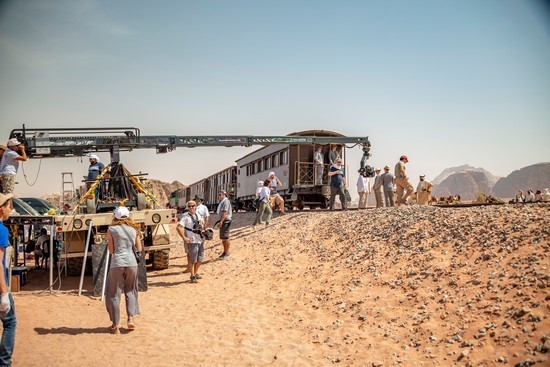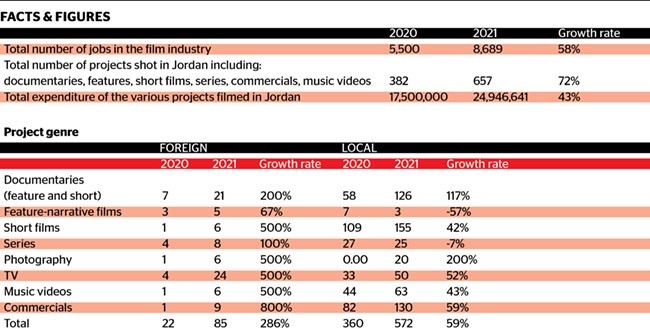In 1962, David Lean shot his film,
Lawrence of Arabia, in Jordan. Since then,
the Kingdom has become a destination for international filmmakers, and its film
industry is booming.
اضافة اعلان
The marvelous
landscapes and its exceptional historical heritage make Jordan a dream location
for cinema. From
Wadi Rum to Petra, via Amman and the hills of the east, Jordan
is full of ideal settings for making film. Stable and safe, Jordan became a
filming location for many directors.
Now, however, the
sector is facing challenges as the Saudi cinema industry has grown considerably
over the past four years, becoming the focus of major investors in the
entertainment and cinema field.
Not only can Saudi
Arabia compete with Jordan’s various geographical locations, a new strategy
launched by the
Saudi film commission aims to cover up to 40 percent of the
budget for
movies filmed in its territory, under certain conditions.

Since the 35-year
ban on cinema was lifted in 2017, Saudi Arabia has seen a boom in all aspects
of the film industry, becoming the most lucrative region in West Asia in terms
of box office revenues, according to a US magazine. It hosts the Red Sea
International film festival in the city of Jeddah, and over the past 18 months,
three Hollywood blockbusters were filmed in Saudi Arabia: “Kandahar”, which was
filmed in the picturesque landscape of Alula, the “Desert Warrior”, filmed in
Neom, and the crime drama “Cherry”, filmed in Alula and the capital, Riyadh.
Israel in the
picture
The Israeli government aims to “positively brand the country” and
improve the economy through a rebate project that could grant up to $13.9
million to produce foreign films and TV series in the country over the next two
years, according to Jewish News Syndicate.
Qualified
filmmakers — including in the field of animation and those working on TV series
— can receive reimbursement for production expenses of up to 30 percent. The
amount of financial support will be granted based on documentation provided by
the recipients at various milestones throughout the production process. Up to
80 percent can be received during production and 20 percent when the film is
completed.

Reimbursements can
range between $154,347 and $5.1 million. That may be attributed to the fact
that Israel sees Jordan as a “big player”, as Tzvi Gottlieb, CEO of the Israeli
TV and Film Producers Association put it in a statement.
Impact of the growing competition on Jordan
Managing Director of the
Royal Film Commission Mohannad Al-Bakri RFC told Jordan
News: “For over 15 years we have been pursuing a policy and strategy that
proved effective and in line with our main goal, which is developing our own
audio-visual industry, while promoting Jordan as a filming location.”
“Competition is
always good as it forces competitors to improve and keep the standard high.
There are elements that one cannot change and we are lucky to be endowed with
many favorable ones in Jordan (such as the weather and locations), while others
can be improved or enhanced (such as human skills or financial incentives). We
keep on working on the latter, to be as competitive as one can be,” Bakri
added.
This being said,
Jordan has asserted its position in the industry as a very much sought-after
country for filming, thanks to all the above factors. Proof of it is the
increasing number of foreign productions in the country, big productions that
impact positively on more than 38 sectors in the country.

“The economic impact
of filming is very much taken into account, especially that 38 sectors benefit
from it. Hence, we have several incentive
programs that aim at attracting productions, in addition to objectively
favorable conditions in the Kingdom: unique locations, easy processes to get
permits, government support, and a cash rebate that reaches 25 percent,” Bakri
said.
“We are following a
multi-layered approach, which includes attracting and facilitating productions
in the country, building local capacities, nurturing talent in different ways,
developing our own narratives, fostering cinematic culture. Moreover, this
extends beyond the capital, Amman,” he added.
History of Jordanian
cinema
Jordanian cinema had made impressive strides, due mostly to individual
efforts. It was the set for the first film screening in 1925; the first cinema
hall, housing silent movies, was established in 1929. Talking movies started
showing in 1934.
Individual attempts
to develop Jordan’s filmmaking continued in the 1950s and the first feature
film, “Conflict in Jerash”, was made in 1958. This was followed by several
individual attempts to build this legacy, and the first cinema company,
Jordanian Cinema Joint Stock Company, was established in 1946.
Between the 1950s and
1960s, social and political changes influenced the film industry as directors
were coming from abroad.
The film industry
evolved in the 1970s with the help of official efforts; in 1965, the Department
of Film and Television was established by the Ministry of Information.
In 1970, a special
Jordanian Television
Film and Photography Section was established, continuing
this journey by producing documentary and feature television films.
In the 1980s, a
cinema club was founded, a collaborative effort of cinema-loving intellectuals.

In 1989, the Abdul
Hamid Shoman Foundation established a film committee, which to date screens
movies every Tuesday.
With the
establishment of the Royal Film Commission, in 2003, production became more
organized, and a fund was set aside in support of young people, with local,
Arab and international partnerships under an official umbrella.
Movies filmed in
Jordan would often become blockbusters and win important awards.
In
2008, Jordan established a specialized institute for cinematography at a global
academy based in Aqaba, the Red Sea Institute for Cinematography.
The number of
Jordanian film productions has increased since 2007 to date, driven by young
people’s passion for cinema, and the presence of local talents with stories
that deserve to be told.
In 2016, Jordanian
cinema made history with the arrival of “Theeb”, the first film by Naji Abu
Nowar, nominated for an Oscar in the best foreign film category.
The Jordanian film
scene is still evolving with small steps and persistent individual attempts,
which were the greatest motivation for the birth of the “
Amman International Film Festival - Awal Film”, in 2020, in its third edition this year.
Promoting Jordan as filming destination
“Jordan has competencies, specialized companies and individual
qualifications that have gained extensive experience by dealing with foreign
teams that make Jordan distinct from any other destination,” said Alaa Hindi,
director of Digital Marketing and Communications at Jordan Tourism Board.
Talking about the
role JTB plays in promoting Jordan as a filming destination, Hindi told Jordan
News: “Expenses are covered for directors conducting expeditious tours in
search of locations for filming their films. Certain exemptions are granted,
logistical services and licenses are given in cooperation with the Royal Film
Commission.”
Jordan’s effort to be unique in the movie industry
“The film industry has always been competitive. There are indeed new
players now in the region. We obviously have to consider those, while pursuing
our policy and our marketing strategy” said Bakri.
Significant figures
Local film production in Jordan provided 8,698 filmmaking jobs in 2021,
compared to 5,500 in 2020, a 58 percent growth, according to RFC figures.
RFC lent its
support to 657 projects in Jordan, including documentaries, feature and short
films, television series, advertising and videos, in 2021, compared with 382 projects
in 2020, a 72 percent growth.
The total volume
of expenditure for the various types of projects filmed in Jordan was
JD24,946,641 in 2021, compared with JD17,500,000 in 2020, a 43 percent growth.
The range of
services provided by RFC largely facilitate the work of production companies,
from scouting for location to obtaining permits, and to customs clearance,
among others.
 Read more Entertainment
Jordan News
Read more Entertainment
Jordan News





